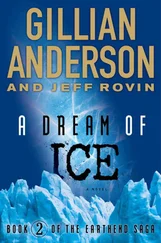Gillian Anderson and Jeff Rovin
THE SOUND OF SEAS
The publisher has provided this ebook to you without Digital Rights Management (DRM) software applied so that you can enjoy reading it on your personal devices. This ebook is for your personal use only. You may not print or post this ebook, or make this ebook publicly available in any way. You may not copy, reproduce, or upload this ebook except to read it on your personal devices.
Copyright infringement is against the law. If you believe the copy of this ebook you are reading infringes on the author’s copyright, please notify the publisher at: simonandschuster.com/about/contact_us.
Vilu woke in dull sunlight.
With his eyes still half-closed, the young boy growled like a thyodularasi pup and stretched his bare, gangly limbs in unison. Then he deflated and lay for a moment on the narrow cot, feeling the warm new day from his fingertips to his toes. He squeezed his eyes shut then opened them wide, blinking away sleep. He snuggled down on the mattress filled with oiled sea sand and looked around the small, fragrant room. Like all the rooms in the complex, it was a tiny place, barely large enough for his bed and a standing closet for his few clothes and possessions.
The home in which he lived was shaped like a large wheel. It was constructed of heat-retaining basalt stones piled one atop the other and coated with thick plaster made from seawater and crushed jasmine petals. He inhaled the invigorating aroma deeply. Vilu once asked the house guardian, “Which wakes me first? The light of the sky or the warming of the new day?”
“Which do you think, boy?” the man asked.
“The warming,” Vilu had replied without hesitation. “Because it not only warms, it makes the jasmine and the bed oils smell stronger.”
“Then it is the warming,” the man said, smiling.
“Anyway,” one of the other boys, Sahu, had said later, when they played in the courtyard after lessons, “it is always daytime during this season. There is always light. That wouldn’t wake you.”
“It wakes the seabirds,” Vilu had replied. “I hear them. Why not us too?”
“They wake because they are hungry!” Sahu replied dismissively.
“If that were true, you would never sleep,” Vilu said, laughing.
Sahu had no answer for that other than to shrug and continue consuming the petal-flavored ice he had purchased.
But Sahu had a point. Vilu had learned in their school that at this time of the season the sun circled overhead like a block of ice caught in an eddy. Even the window shades, made of opirati skin, could not darken a room completely. Vilu would have to remember to ask their tutor if sleeping people could react to little variations in light. The Priests said that quiet minds were actually wiser than those that were fully awake. But the Technologists disputed that idea, as he understood it.
If adults cannot agree, then why bother learning anything? the boy wondered. Then he smiled. I wondered that in my head! Does that mean the Priests are right?
There were no lessons today and, lying lazily on the mattress, Vilu studied the dark, charcoal-gray light that rose on the walls. It barely illuminated the designs that reached from floor to ceiling. The designs had been cut in the plaster by the local Priest, hoping for Candescence to shine on this abode. A Technologist had added flecks of olivine to the eyes of figures in the design. Vilu didn’t understand the markings. It told a story about designs in the night sky, about lights strung across Galderkhaan like phosphorous fish. The Priests recited it in words he heard nowhere else. A few of the older children found it interesting. He found it confusing and boring.
He stretched again and continued to lie in bed, listening to the soothing sound of the ocean as it sloshed against the coast. As dreamtime left, he began to hear the familiar sounds of voices along the wharf, of the airships’ ropes creaking on the current, of the fishers returning from their predawn hunt—
Fishers returning? the boy thought with sudden excitement. Then why am I lying here?
Typically, the bell would have rung by now and he would be at the adjoining home taking lessons with one of the teachers, but this was not an ordinary day. It was a time of celebration, the Night of Miracles, and the scholars were all in the capital city of Aankhaan, representing the village of Falkhaan in the festivities. Several of his friends had gone, but Vilu did not want to make the long journey by cart and raft. Those conveyances were too slow, too dull.
A real Night of Miracles would be if things were exciting for once! he thought, only half regretting his irreverence. At least the morning had potential to be exciting if he hurried .
Vilu leapt from his mattress, its mushy surface retaining his shape. He pulled off his short white nightshirt, dressed quickly in loose-fitting drawstring trousers and a roomy pullover, and ran toward the flap that hung heavily in his doorway. Pushing it aside, he nearly tripped over his long blue pant legs as he sped through the corridor. He hitched them up and expertly rolled the bottoms as he ran.
Each of the eight spokelike sections of the circular home opened onto triangular communal courtyards between the residential arms. Here, young children could play with minimal supervision from the adults. The courtyards were protected from the street by heavy opirati skins that only the older children could raise.
Limbs churning, Vilu thrust himself through one of the skins like a force of nature. He had selected this exit because the communal caregivers were on the other end of the home, organizing recreations for when the children woke. Vilu did not want to be stopped and told to gather the little ones. For one thing, he did not want to participate in the games and plays designed to help children understand and celebrate what Vilu did not quite understand nor wish to celebrate. Only two things mattered dearly to him: the thyodularasi who he swam with in the sea and, more—much more—the airships, especially the well-known ones piloted by the really great Cirrus Cloud commanders, the likes of Femora Loi and Femora Azha in the fleet of Standor Qala. Vilu had heard that Azha of the coastal city of Aankhaan was in very bad trouble, but he didn’t care: she had once given him a ride in the clouds and he would always love her for that.
“I wondered when we would see you!” cried a fish seller wheeling his basket from the airship field to the market.
“You’d better hurry!” yelled another.
Vilu only had time and breath enough to wave with a circling motion, showing respect to the older women. He was glad his mother’s mother was not here, for then he would have to stop and bow to her. There were more rituals in Galderkhaan than a restless boy had time for.
Arms and legs pumping, Vilu squinted against the light but he did not turn from the sun. He wanted to try and spot the great airship of Standor Qala, see it soaring clear and proud before the massive vessel passed in front of welaji , the light in the sky—teaching that distant ball of magma just who had command of the air!
A large hollow sound echoed through the skies. Vilu felt it in his belly. That was it! He had to hurry.
Breathing hard, the young boy ran across the densely packed, sun-hardened sand, wishing he had paused to pull on his footings. But there had been no time, and hadn’t the local Priest once said to the fishers that labor toughens the flesh the way strife toughens the spirit the way destruction had strengthened the Candescents? Isn’t what they were celebrating today—the disaster that gave birth to all life?
Читать дальше













